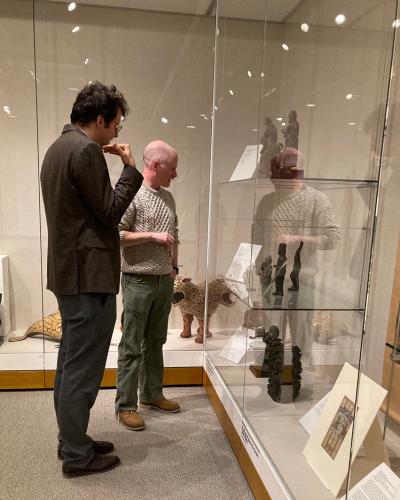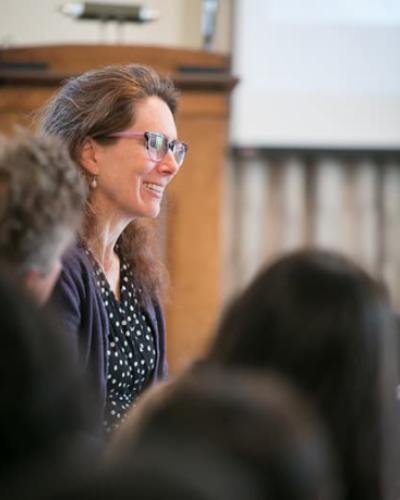Fellow Amy Sara Carroll MFA ’95 is a poet, scholar, and visual artist whose work engages cultural production at the US/Mexico border. Her first critical monograph, REMEX: Towards an Art History of the NAFTA Era, was released on December 15 from the University of Texas Press. REMEX presents a comprehensive exploration of artistic work produced within the framework of the North American Free Trade Agreement (1994–2008).
Carroll is spending the 2017-2018 academic year as a Fellow, working on her next book, an exploration of three contemporary Mexican filmmakers in the context of Mexico’s global co-production. In addition, she is collaborating with Society Fellow Ricardo Dominguez on a book of "undocumentation" structured as four plays and two interludes. The book focuses on an artivist project, the Transborder Immigrant Tool, by Carroll, Dominguez, and other collaborators.
For the Spring 2018 semester, Carroll is teaching a course titled “Undocumentation” (SHUM 4620), an interdisciplinary seminar for advanced undergraduate and graduate students. The course is about border cultural production, art, and performance, from the 1980s through now. Carroll approaches this rich archive of work via feminism, critical theory, as well as the historical and political context of the enactment of NAFTA and the concurrent industrialization and militarization of the US/Mexico border.
While she largely works on topics that may feel geographically removed from Cornell’s campus, Carroll feels a connection to Ithaca. During her first semester in Cornell’s Creative Writing MFA program, Carroll was struck by a site-specific artwork that was installed on the arts quad as part of the 1993 exhibition, Revelaciones. Daniel J. Martinez’s installation took the form of walls constructed around the quad’s pathways, which quickly became a focus of conversation, controversy, and racist vandalism that inspired the Latino student takeover of Day Hall.
The significance of returning to Cornell during a climate of immigration anxiety is not lost on Carroll. “We are always so close to the border whenever we are in the US,” she explains, “because of these debates around immigration that intensified in the late 1980s and are connected to the current polarized climate.” She returns to the image of Martinez’s installation as a touchstone, a barricade that has never come down. “It was a materialization of obstacles in higher education that are still very much in place,” she reflects, citing recent racially-charged incidents on Cornell’s campus.
This year as a Fellow at the , she has found valuable time and space to devote to her interdisciplinary projects. Each year, the brings together an interdisciplinary group of Fellows working in the humanities under a common theme. The theme for 2017-2018 is “Corruption.” In Carroll's case, her undertaking of two projects simultaneously allows these academic and creative genres to corrupt one another, just as the subjects of her work have corrupted straightforward understandings of critical writing, art, and public policy.
Related articles:
Fraternity Member Allegedly Chants ‘Build a Wall’ Near Latino Living Center (Cornell Daily Sun, 2017)
Recalling the '93 Day Hall takeover by Latino students (Cornell Chronicle, 2014)





